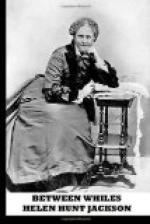John sat by with roused attention and sharpened perception, noting all. Had it been all along like this? Where had his eyes been for the past month? Had he too been under a spell? It looked like it. He groaned in spirit as he sat silently playing with his food, not eating; and when his father said, “Why haf you not appetite, Johan?” he rose abruptly, pushed back his chair, and leaving the table without a word went out and down again into the pasture, where the dewy grass and the quivering stars in the brook shimmered in the pale light of a young moon. To John, also, the mossy rocks in this pasture were a favorite spot for rest and meditation. Since the days when he and Carlen had fished from their edges, with bent pins and yarn, for minnows, he had loved the place: they had spent happy hours enough there to count up into days; and not the least among the innumerable annoyances and irritations of which he had been anxious in regard to Wilhelm was the fact that he too had perceived the charm of the field, and chosen it for his own melancholy retreat.
As he seated himself on one of the rocks, he saw a figure gliding swiftly down the hill.
It was Carlen.
As she drew near he looked at her without speaking, but the loving girl was not repelled. Springing lightly to the rock, she threw her arms around his neck, and kissing him said: “I saw you coming down here, John, and I ran after you. Do not be angry with me, brother; it breaks my heart.”
A sudden revulsion of shame for his unjust suspicion filled John with tenderness.
“Mein Schwester,” he said fondly,—they had always the habit of using the German tongue for fond epithets,—“mein Schwester klein, I love you so much I cannot help being wretched when I see you in danger, but I am not angry.”
Nestling herself close by his side, Carlen looked over into the water.
“This is the very rock I fell off of that day, do you remember?” she said; “and how wet you got fishing me out! And oh, what an awful beating father gave you! and I always thought it was wicked, for if you had not pulled me out I should have drowned.”
“It was for letting you fall in he beat me,” laughed John; and they both grew tender and merry, recalling the babyhood times.
“How long, long ago!” cried Carlen.
“It seems only a day,” said John.
“I think time goes faster for a man than for a woman,” sighed Carlen. “It is a shorter day in the fields than in the house.”
“Are you not content, my sister?” said John.
Carlen was silent.
“You have always seemed so,” he said reproachfully.
“It is always the same, John,” she murmured. “Each day like every other day. I would like it to be some days different.”
John sighed. He knew of what this new unrest was born. He longed to begin to speak of Wilhelm, and yet he knew not how. Now that, after longer reflection, he had become sure in his own mind that Wilhelm cared nothing for his sister, he felt an instinctive shrinking from recognizing to himself, or letting it be recognized between them, that she unwooed had learned to love. His heart ached with dread of the suffering which might be in store for her.




